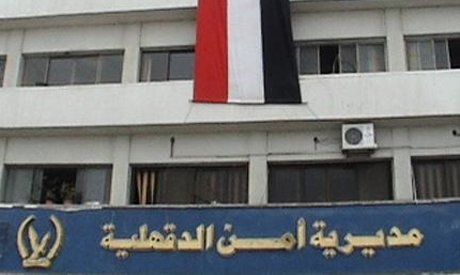
File photo: Daqahliya's security directorate headquarters, located in Mansoura (Photo: Al-Ahram)
An explosive device went off at a police station near the security directorate in Mansoura, the capital of Daqahliya governorate in the Nile Delta, killing at least one conscript and injuring 19 late on Tuesday.
A security source, who spoke on condition of anonymity, told Ahram Online the explosion was "likely" to have been caused by a "bomb thrown at the police station."
According to a statement released by the Interior Ministry, 12 police cadets and conscripts had been injured. The Ministry of Health later stated the injury toll had reached 19, including civilians.
Medical sources confirmed the deceased was a police conscript.
The explosion also damaged several police vehicles and smashed the police station's windows, according to the Interior Ministry's statement.
Shortly after the blast, police fired teargas at an abandoned building near the police station, suspecting that the assailants, who remain at large, were hiding inside.
Police personnel were heavily deployed in the area, assisted by checkpoints set up by civilians to prevent further attacks.
Presidential media advisor Ahmed El-Muslimani described the incident as a "terrorist attack."
"The terrorist act in Mansoura will not soften our will. We have won the war against terrorism once, and we shall win [it] today," he said.
This is the second explosion to take place near a police station in Egypt in less than a week.
Last Saturday, a bomb exploded in the parking area of Abu Soweir police station in the Suez Canal city of Ismailia, destroying three police vehicles and injuring no one.
Also last week, the Interior Ministry announced it had detected and defused a bomb planted below Gamaa Bridge near Cairo University.
Meanwhile, police stations and units in Sinai have been repeatedly attacked by militants since the ouster of former president Mohamed Morsi.
Assailants have used heavy artillery during frequent clashes with police and military forces in the turmoil-hit peninsula.
Morsi was toppled after one year in office as part of the armed forces' roadmap for Egypt's future, which was enforced after millions hit the streets across the country to call for his overthrow.
Since the ouster of Morsi on 3 July, Egypt has witnessed massive nationwide demonstrations staged by his supporters, who have been demanding his reinstatement.
Amid frequent confrontations between Morsi's supporters and opponents, there have been concerns that some of Morsi's Islamist loyalists would escalate violence.
Several Islamist groups were found guilty of acts of terrorism during the 1980s and 90s, including the ultra-conservative Al-Gamaa Al-Islamiya (a staunch supporter of Morsi nowadays).
At the time, security forces came down hard on Islamist groups, who in turn opted to abandon violence in the late 1990s. Later on, the 2011 revolution paved the way for many Islamists to launch political parties after long suffering oppression under Mubarak.
The Muslim Brotherhood, the group from which Morsi hails, has repeatedly said it would never resort to violence and would continue to peacefully call for the ousted president's reinstatement.
Short link: